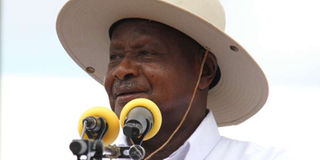What does Museveni’s war on the demons he created teach us?

Uganda's President Museveni, who has been in power for 33 years. PHOTO | GAEL GRILHOT | AFP
What you need to know:
- Dictatorship, even when the dictator is benign and generally useful, breeds both as a matter of course.
- Neglect, corruption, incompetent allocation of resources and management of public affairs and impunity are the natural fathers of crime.
Susan Magara, 28, was kidnapped at her gate in Kampala on February 7.
She was in captivity for 21 days, during which her kidnappers sent her family her severed fingers to press their demand for $1 million ransom. In the end, they killed her anyway and dumped her body on the Entebbe highway like so much rubbish.
But she was far from rubbish: She was a beautiful girl, the very flower of Ugandan womanhood, down to earth and reportedly spiritual.
One of her childhood teachers described her as a calm child “who loved prayer” — a description I hadn’t heard of anyone before.
And she was from a wealthy, well-connected family both back in Bunyoro, where her father was a prominent dairy farmer and rice miller, and in Kampala, where her grandparent was a senior adviser to President Yoweri Museveni.
Her story dramatized an unfamiliar, but now very serious, problem for Uganda: Crime. Kenyans loved Uganda, because, unlike home, it was safe. You could wear your jewellery to town without any risk of having your ears lobbed off.
Not anymore. Petty crime and serious gun crime are, unfortunately, now common in Uganda.
HUMILIATED
President Museveni was recently humiliated when an MP was gunned down during the visit of the new Ethiopian prime minister.
I have just been reading stories of a murder suspect being strangled and strung up in police custody.
The Ugandan crime situation is probably as bad and dramatic as the Kenyan one can be, what with stories of spaces in downtown Kampala, where thugs have chairs for their victims to sit on as their expensive weaves are removed from their heads.
The day before yesterday, President Museveni appeared before Parliament to give a presidential speech on what he was doing to restore public safety.
He began his narration in 900AD, including copious quotations from Henry Morton Stanley, the British explorer and coloniser. He lost me around 1992.
I have not seen a sleepier assemblage in this life. MPs were not just bored with the history lecture; they looked like they would pass out for the sheer tedium of the occasion.
Ugandans have been struggling to understand this spike in criminality.
I read one article about how poverty has pushed many people into petty crime. But, of course, it does not explain kidnap and the gangland-style execution of MPs.
NEVER FAR FROM POWER
In dealing with this relatively new phenomenon — just like we are with the old phenomenon of corruption — Ugandans will probably come to my conclusion that crime, just like corruption, is never far from power.
Dictatorship, even when the dictator is benign and generally useful, breeds both as a matter of course.
Neglect, corruption, incompetent allocation of resources and management of public affairs and impunity are the natural fathers of crime.
When he swung into action, President Museveni, who even in old age is a reasonably resolute guy, sacked his police boss, General Kale Kayihura, a man he previously approved of because, as the Monitor reported, he succeeded in turning the police into a militia of the National Resistance Movement.
Before he became the Inspector-General of Police, Gen Kayihura was Chief Political Commissar of the Uganda People's Defence Forces (UPDF).
The position, with its vaguely Soviet connotations, is possibly an alien being to us, but I suppose the easiest way to understand his role is as some kind of propagandist who sells and enforces the party ideology to soldiers.
President Museveni is big on ideology. He believes that a soldier must fight and stand for some ideology. Our own generals would choke on their hibiscus tea at the mere thought.
32 YEARS IN POWER
But President Museveni has survived in power for 32 years, written and mutilated a constitution, won wars and vanquished many enemies by politicising stuff. So, don’t knock ideology.
What is far from clear is whether his politicisation of the Ugandan police, in the end, did not unleash a monster on the people.
From the Monitor’s reporting, Gen Kayihura led the police generally the same way that President Museveni rules Uganda: Relying on his charisma and judgment rather than being rule-bound and detached.
Gen Kayihura surrounded himself with officers that he promoted not because they were suited or qualified for their positions, but loyal and useful.
They could unleash terror on opposition leaders and followers and suppress the people on behalf of the regime.
He took it a step further: He recruited a private army of criminals, including the Boda Boda 2010 Association, a grouping of motorcycle riders which he used to gather criminal intelligence and brutalise demonstrators. But criminals are difficult to control: They will work for you but they indulge in a sport of freelance enterprise, too.
President Museveni has called out the army to clean up after Gen Kayihura, who was arrested with all the drama befitting the circumstances, including military roadblocks and helicopters. He will be court-martialled next week.
Does it work, this blend of the military and politics in place of institutions? The answer is important for Kenyans because we are also experimenting with the securitisation of our society.





